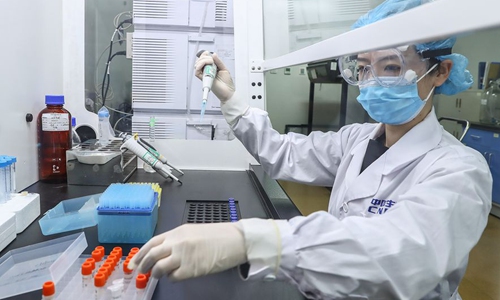COVID-19 not a chronic disease despite long-lasting positives: experts
By Wang Qi Source:Global Times Published: 2020/4/29 21:23:41

A staff member displays a sample of the COVID-19 inactivated vaccine at a vaccine production plant of China National Pharmaceutical Group (Sinopharm) in Beijing, capital of China, April 10, 2020. Photo:Xinhua
Concerns about 30 "long-lasting positive" patients in hard-hit Wuhan remain even after the city on Tuesday announced zero new confirmed COVID-19 patients and zero existing cases for three consecutive days.Amid public concerns that the coronavirus could exist in human bodies for a long time and make a carrier a chronic patient, experts told the Global Times on Wednesday that the "long-lasting positive" does not suggest the coronavirus is evolving into a chronic disease, but more likely shows their slow detoxification of the virus.
Long-lasting positive patients are infected people whose symptoms have disappeared but who continue to test positive in the nucleic acid tests, and most of them need no more treatment, said Jiao Yahui, an official at the National Health Commission.
These patients do not meet the diagnostic criteria of COVID-19 and are no longer considered active patients. That's why Wuhan announced the "zero existing case" on Monday even with such long-lasting positive cases, analysts said.
Wu Zunyou, the chief epidemiologist at the Chinese Center for Disease Control and Prevention (CDC), said that "existing zero" means there are no more patients at the hospitals for COVID-19 treatment, but that does not mean all patients who had contracted COVID-19 are discharged and have returned home.
The "long-lasting positive" patients are unlikely to stay positive forever like hepatitis B, and the coronavirus will not turn into a chronic infectious disease, Yang Zhanqiu, the deputy director of the Pathogen Biology Department at Wuhan University, told the Global Times on Wednesday.
A previous study shows that the detoxification period of some patients could be as long as 60 days.
Yang said most of the "long-lasting positive patients" at the hospitals are vulnerable elderly with weak immunity and other chronic diseases, which makes the process of fighting the remaining virus in their bodies very slow.
He believes that "long-lasting positive" patients are those "almost cured." Because of the low virus dose in their body, the clinical symptoms disappear. It's similar to many other diseases.
It has been reported that the infectivity of such patients has not been determined yet, and some called for home isolation for such patients.
They will not be discharged from the hospital until two negative test results are obtained, Yang said of the national discharge standard. He stressed the need for quarantine and medical observation as they might still be infectious.
Some of the patients were transferred from designated hospitals to community hospital quarantined wards. They are receiving treatment for their underlying conditions to boost their immunity and completely eradicate the coronavirus, Yang said.
Posted in: SOCIETY